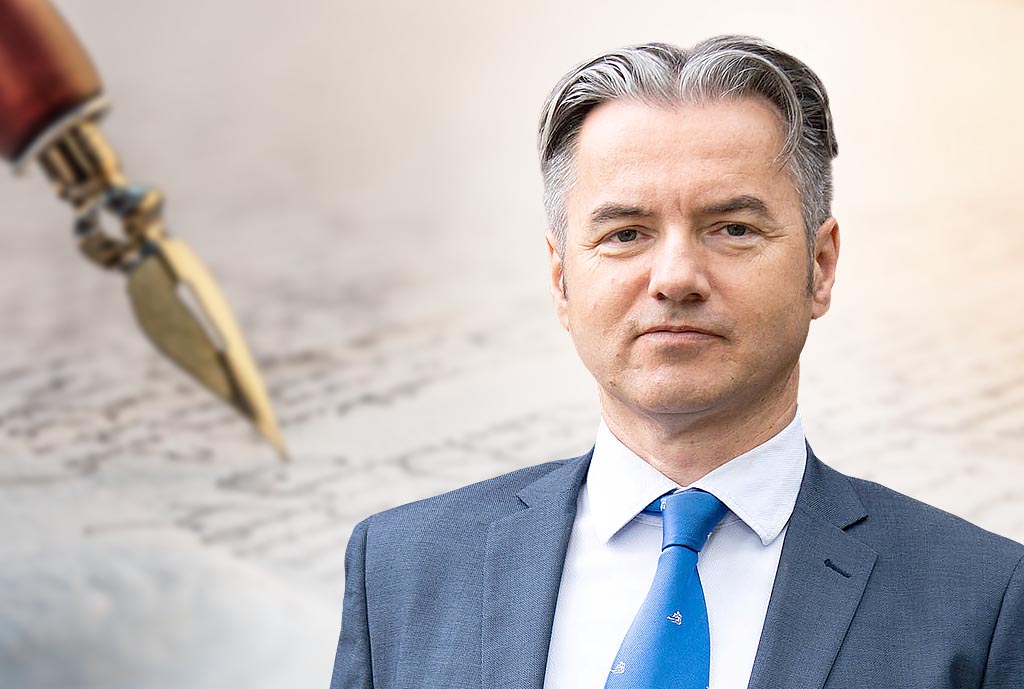By: Dr Metod Berlec
Last week, the government led by Robert Golob held a “post-holiday” session. Notably, once again, there was no press conference after the government meeting. This is probably because there is nothing of substance to show, as in the first half of its term, it has not been able to carry out even a single significant reform. It has only nullified the achievements of the previous government and recklessly raised taxes.
As a result, under their rule, the Index of Economic Freedom published by the American Heritage Foundation has declined, along with the competitiveness of the Slovenian economy. This is why a poll by Mediana for POP TV, which showed a significant drop in support for Golob, attracted some attention. According to this poll, the most (?) popular politician is the President of the Republic, Nataša Pirc Musar. In second place is MEP Vladimir Prebilič, and in third place is the Minister of Economy and President of SD, Matjaž Han. According to the poll, Prime Minister Golob is only in 19th place, while SDS leader Janez Janša is in 10th. If elections had been held last Sunday, 23.6 percent of respondents would have voted for SDS, 17.7 percent for the Gibanje Svoboda, 6.8 percent for SD, and 4.2 percent for NSi and Vesna. The Levica would have received 3.8 percent support, while the other parties would have received much less. At the same time, the share of undecided voters appears to have increased…
In the magazine Demokracija, we have often pointed out that public opinion agencies in our country not only measure public opinion but also artificially create it. This has been happening throughout Slovenia’s transition period. A master of such feats for many years was Niko Toš, a close associate of Kučan, with his Centre for Public Opinion Research. Something similar applies to Nikola Damjanić and his agency Ninamedia. Let us remember how in the 1990s, the last head of the party and then-President of the Republic, Milan Kučan, with the help of regime media and cleverly directed polls, disciplined the then-Prime Minister Janez Drnovšek if he was too headstrong, strayed too far from Kučan’s line, or tried to act against the interests of the transitional left. He quickly faced a media onslaught and then polls showing a significant drop in voter support. In such cases, Drnovšek almost always “pulled back”. Something similar, but in a much more media-friendly version, is happening to Robert Golob recently, who is more concerned with his partner, Tina Gaber, than with governing. In this respect, Golob is in a slightly better position, as he ensures his promotion with the help of parts of the media (mainly those owned by media tycoon Martin Odlazek) and, with the assistance of the notorious Vesna Vuković, goes after the President of the Republic, Nataša Pirc Musar, her tycoon husband, Aleš Musar, and others who are not politically or otherwise favourable to him. Golob is so self-assured in this regard that he is quite resistant to suggestions coming from various circles, including those in Murgle.
Therefore, it is not surprising that the Commission for the Prevention of Corruption (CPC) has once again been engaged to discipline him. Last Thursday, the CPC announced that the Senate of the CPC “adopted a decision at its mid-week correspondence session to continue the investigation due to suspicions of breaches of integrity in connection with a report on alleged unauthorised pressure on former Interior Minister Tatjana Bobnar, directed against Prime Minister Robert Golob.” There are also reports from the Balkans indicating that investigations and legal proceedings are underway against some of Golob’s business partners or cronies from his time leading GEN-I. It is therefore not surprising that the Speaker of the National Assembly, Urška Klakočar Zupančič (GS), is going to great lengths (illegally) to prevent the establishment of a parliamentary inquiry commission proposed by SDS and NSi MPs, which would determine potential political responsibility “of public office holders due to suspicions of influencing allegedly uneconomic or unlawful decisions of management and supervisory bodies of energy companies that are indirectly or directly state-owned.” Golob is indeed as fearful of a parliamentary inquiry commission dealing in any form with his past actions as the devil is of the cross. He seems to be less afraid of Kučan, whose behind-the-scenes power is waning, as he has the support of the notorious Ljubljana Mayor Zoran Janković.
But even though we currently see tensions within the ruling left, one thing is clear. Everything is still connected by the umbilical cord to the previous totalitarian regime, as evidenced by the fact that the last President of the Executive Council of the Socialist Republic of Slovenia, Dušan Šinigoj, was unjustifiably buried with military honours on Friday…

